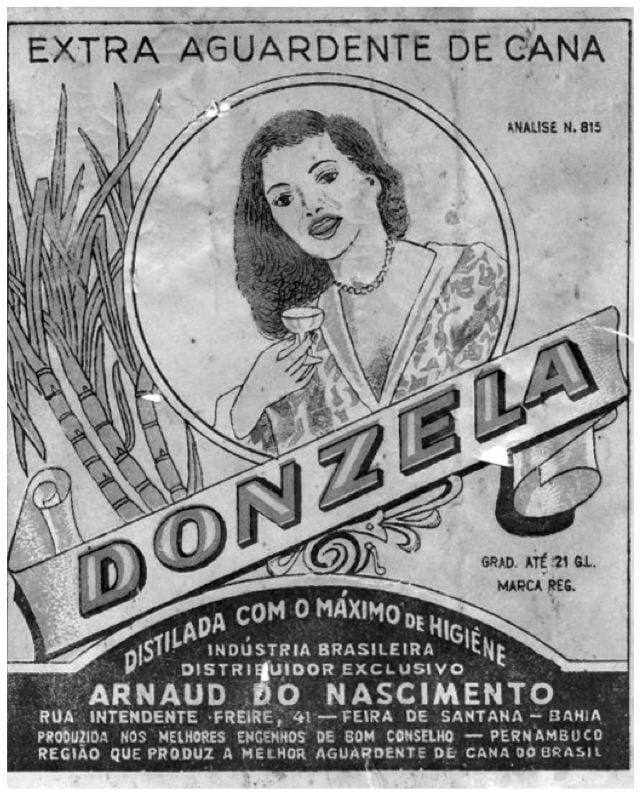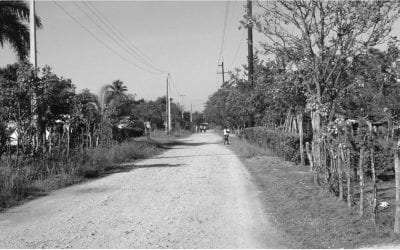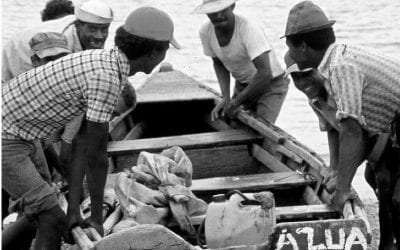Have You Ever Viu Na Vida?
A Peace Corps Experience in Brazil

This label from a cachaça (firewater) bottle is a classic from Pernambuco. Image from James Ito-Adler’s Cachaca Bottle Label-Collection
In the very late sixties, as a Peace Corps Volunteer in Brazil, I scribbled a small poem in a travel delirium brought on by a heady combination of hunger and strong spirits—cachaça, to be precise—on a long bus ride between Recife and Rio de Janeiro. We PCVs in Brazil were poorly paid in those days and I had precious little money to spare on this trip. The Itapemirim bus stopped every so often for refueling and I basically ate bread and olives while ordering a shot of localaguardente and—por favor—an empty bottle of same from which I would later carefully remove the label for my collection of folk art.
The poem sprang full-blown from our habit of mixing English and Portuguese in our small bilingual speech community. It proceeds:
Have you ever viu na vida
No, I never did vi
Gente quite as happy como tu and me
Si you fosse minha
What alegria I would tinha
And juntos ever more
Podíamos be.
Doggerel to be sure, but true to our speech patterns. We namorar-ed in the praça, went down to the comp’rativa (the local pronunciation in the interior of “cooperativa” where many of us worked), and met at the praia in Boa Viagem to pular Carnaval.
Most of the volunteers in my circle were from the cohort of young Americans who had been selected to work with the federation of mixed cooperatives in the interior of the state of Pernambuco. These mixed coops (production and consumption) were linked with progressive elements in the Catholic Church and supported by CLUSA (Cooperative League of the U.S.A.). They were among the few surviving institutions working with rural peasants that remained after the military coup in 1964 had destroyed many of the unions and peasant leagues in the rural zones of Pernambuco.
This cohort was generally older and more educated than most of the B.A. generalists who filled the Peace Corps ranks, in part because of the volatile and highly politicized situation in Pernambuco at this time. A surprising number were lawyers, a group I semi-qualified for being a Harvard Law School drop-out. Meanwhile, the situation in the United States was also increasingly volatile and politicized as our group began training in Milwaukee, Wisconsin in the fall of 1967. In response to the rising alienation of our generation over Vietnam, student movements were increasingly militant.
For trainees from the East Coast, Milwaukee proved to be more racially intense than anticipated. Father James Groppi was leading civil rights marches in downtown Milwaukee, and soul singer James Brown played a concert memorable for a confrontation between several impressively huge white police officers and a synchronized line of dancing Black pre-teen girls, who when told to take their seats, told the officers in no uncertain terms what they could do with their night sticks. Memorable to me at least, because I remember trying to translate this eloquent example of Black vernacular into Portuguese for Antonio, our gentle professor-poet from Bahia, who had never heard Black kids talk to white cops in quite that manner.
After training, we found ourselves immersed in a rural environment in the midst of intense poverty and escalating repression, reaching a peak in Brazil in the period 1968-70. We encountered culture shock and difficulties adjusting to the frustrations of an ill-defined job and, indeed, I believe we were among the last of the community development PCV’s in Brazil. There were few tangible rewards for our efforts beyond personal satisfaction at survival against the odds and a growing appreciation of the calor humano— “human warmth”of our Brazilian neighbors. In spite of their poverty, they seldom held the fact of our being Americans against us and were willing to share their rich culture and life experiences with us. And no doubt our often bumbling efforts to learn their language offered the occasional dose of unintentional comic relief.
I stress this fact, because for a variety of reasons we made little headway in getting to know young Brazilians of our own socioeconomic or educational background, especially in the capital, Recife. The students did not often forgive us for being Americans and we were generally considered to be CIA spies and agents. We were basically too poor to socialize with them in any case, since on $68 a month the clubes and upscale boites were beyond our reach. And the version of Portuguese we were learning to speak so fluently was that of peasants in the interior, poor people in the urban slums, and at best the regional accent of Pernambuco.
Once I was asked by my U.S. Peace Corps Director to come to the office to meet a Brazilian woman he had known in São Paulo through the progressive Catholic student movement during his former life as a priest in Brazil. The young woman wanted to visit one of the Recife slums that figured so prominently in the programs articulated by southern Brazilian activists; the poor bairro where I lived and worked fit the bill. We spent the day in Peixinhos, site of the municipal slaughterhouse, ate lunch at the Bar dos Vaqueiros (Cowboy’s bar), while the urubus (vultures) flew in lazy circles overhead.
Enthralled with the experience, she invited me to visit her if I were ever in São Paulo. She gave me a visiting card with her name and address in what turned out to be a very chic neighborhood off the Avenida Paulista. The day I actually showed up to pay her a visit, I received an invaluable lesson in the complexities of race, class, and regional differences in Brazil. I was stopped at the front door by the doorman who asked me my business. I replied in my lilting nordestino accent that I was there to see Senhora So-and-So. I was told brusquely to wait around by the back entrance. By-and-by he returned with thesenhora, who upon seeing me, started to laugh, “Seu João, este não é baiano; ele é americano.” “Não senhora,” he replied “Pela fala, ele é baiano mesmo.” The doorman reluctantly accepted her explanation that I was from the United States, insisting “By his speech he really is a baiano.”
The strength of my downscale northeastern accent and travelling clothes to match had masked my American accent and he took me for a poor migrant from the impoverished northeast, who are metonymically referred to as baianos in São Paulo. (In Rio de Janeiro the corresponding term is paraiba, another poor northeastern state.) This in spite of my white face, sincebaianos are generally assumed to be on the darker end of the color spectrum.
This experience in the Peace Corps changed my life and my passion for Brazil eventually led me back to Harvard, where I returned to the study of anthropology. I joined Prof. David Maybury-Lewis’ growing group of Brazilianists, and earned my doctorate with a thesis on the Japanese community in São Paulo. I was not alone in the transition from Peace Corps service to anthropology and I note with pride the work of Nancy Scheper-Hughes who wrote the book, Death Without Mourning, based on her experiences in the next town over from where I had originally been stationed in the sugar cane zone of Pernambuco.
Later, to my chagrin, I later learned from Joseph Page’s book, The Revolution that Never Was (1972) that in fact, Timothy Hogen, who set up the cooperative program in Pernambuco with CLUSA, was said to have been one the most effective CIA agents in Brazil and CLUSA was on the list published by the New York Times of CIA conduits. So it goes…
Winter 2009, Volume VIII, Number 2
James Ito-Adler earned his Ph.D. in anthropology at Harvard in 1987. Subsequently he has served as Visiting Lecturer/Assistant Professor in the Anthropology Dept., Proposal Coordinator/Editor at the Harvard Institute for International Development, Senior Program Officer with the International Health Systems Group at the School of Public Health, and most recently as Program Officer at LASPAUL Academic and Professional Programs for the Americas. He can be reached at jitoadler@gmail.com.
Related Articles
Editor’s Letter: The Sixties
When I first started working on this ReVista issue on Colombia, I thought of dedicating it to the memory of someone who had died. Murdered newspaper editor Guillermo Cano had been my entrée into Colombia when I won an Inter American Press Association fellowship in 1977. Others—journalist Penny Lernoux and photographer Richard Cross—had also committed much of their lives to Colombia, although their untimely deaths were …
The True Impact of the Peace Corps: Returning from the Dominican Republic ’03-’05
I am an RPCV: a Returned Peace Corps Volunteer. For me the Peace Corps was an intense life experience, above anything else. As I continue to reflect on it, I am struck with the many and varied ways in which it continues to affect my life. As a PCV in the Dominican Republic from September 2003 to November 2005, I lived, worked, and learned in a small sugar cane-dependent community two hours outside of Santo Domingo…
In the Shadow of JFK: One Peace Corps Experience
I am often asked about the Peace Corps by students and recent graduates. The most frequent questions are, “why join?”, “what did you do?”, and “what has it meant for your career?” Here is my story. My earliest recollection of international curiosity was in the fourth grade when Sister Margaret Thomas described her experience as a recently returned missionary in Bangladesh. In high school, my sister Mary went to Peru on …



